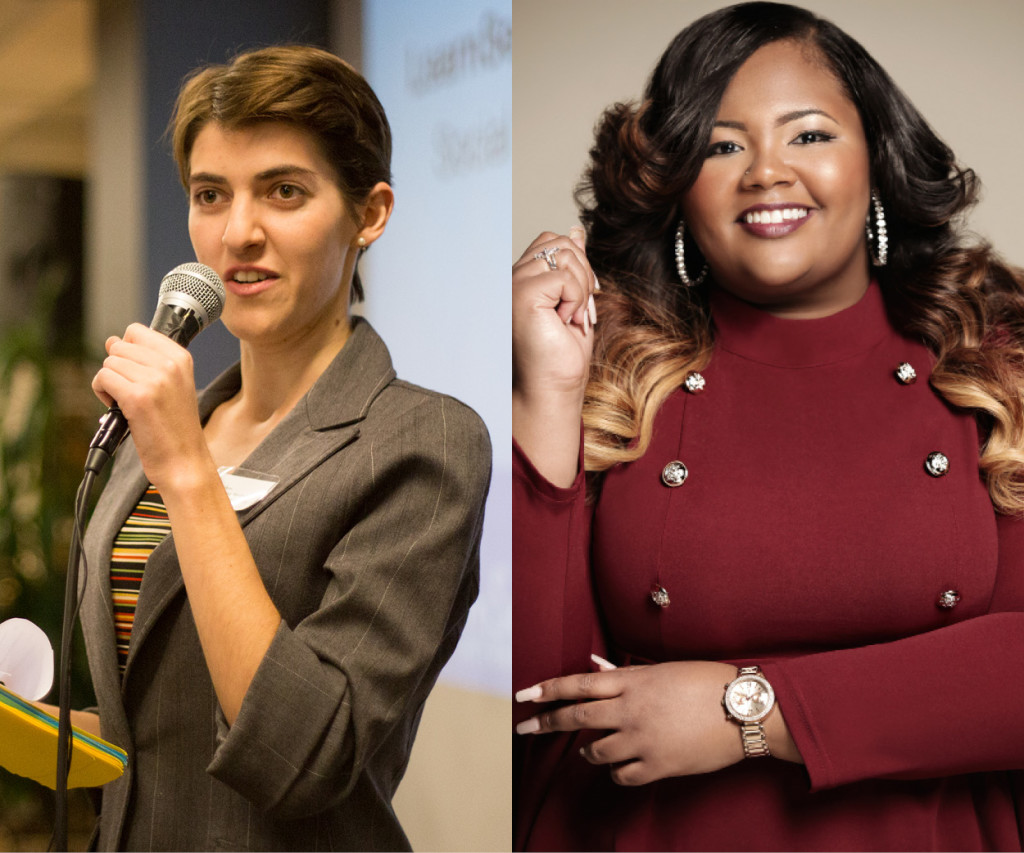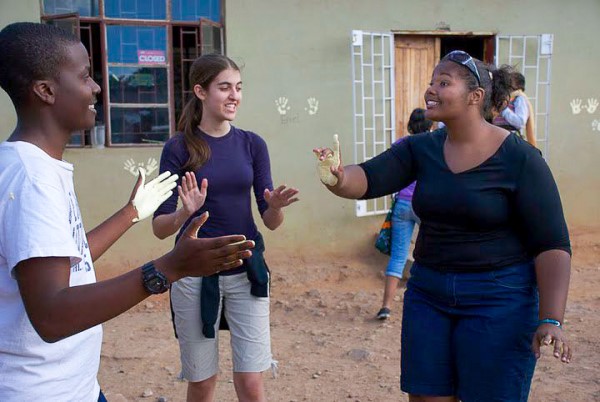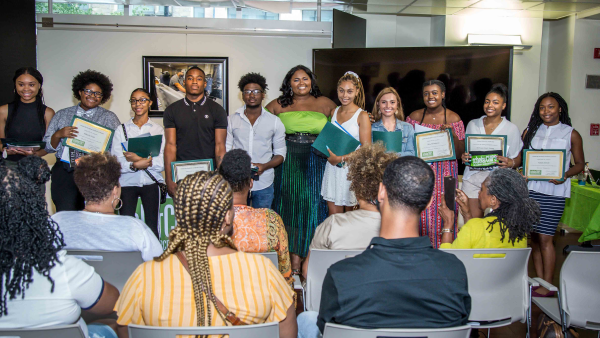Written by Matt Gayer, Co-Executive Director of the Catalogue for Philanthropy
It’s always a privilege, and just a lot of fun, to talk with someone living out their passion — doing work they care about. It’s even more fun when you are talking to two people doing so, and those two people are lifelong DMVers who love this city, making change, and laughing.
The following is a December 2019 interview I was proud to be a part of with Emma Strother, Development Manager at LearnServe International, and Yasmine Arrington, Founder and Executive Director of ScholarCHIPS. LearnServe is a DC-based nonprofit that equips middle and high school students from diverse backgrounds with the entrepreneurial vision, tenacity, confidence, and leadership skills needed to tackle social challenges at home and abroad. ScholarCHIPS is also based in DC and focuses on providing college scholarships, mentoring and a peer support network to children of incarcerated parents, inspiring them to complete their college education.
What made this interview especially exciting is that ScholarCHIPS is a “second-generation” Catalogue for Philanthropy member. Yasmine founded ScholarCHIPS in 2010 when she and Emma were both participants in LearnServe’s Fellows and Abroad Programs. Both LearnServe and ScholarCHIPS were recently selected as two of the best local nonprofits in the region. Any nonprofit in the Catalogue passes a rigorous vetting process, and it is a special honor to have both in this year’s class.
Without further ado, the interview and the enlightening conversation with these two changemakers is below:
Matt: A big part of participating in LearnServe as a student is creating a social venture project. Thinking back, what do you remember from the projects you worked on as part of LearnServe in high school?
Emma: The biggest thing I learned from my project was how to take responsibility and to feel empowered to make a difference. I signed up for LearnServe because I was that traditionally over-achieving student and thought this would add to my resume, but it became something more very quickly. I had an opportunity to combine my passion for music with community building, and it was really empowering to really think about how to use what I cared about to make a difference. More so than my specific project, I just remember LearnServe driving home for me that youth are often told they are the problem or are too young to solve the problem. Scott and others on the team told us that actually we can make a difference right now, and we actually have an obligation to take action when we realize things are unfair or messed up in our community.
Yasmine: I agree entirely with Emma. I didn’t really understand it at the time, but the exposure to so many different leaders, styles, and professional experiences was invaluable. As part of LearnServe, we regularly had speakers come to talk with us. Those guest speakers, sharing their experiences, successes, and failures, helped me to become more of a problem solver and to think more strategically. I’ll never forget when LearnServe staff started the project off, they asked me what pisses me off. For me personally, after some reflection, the issue that hit home for me, and really pissed me off, was mass incarceration and the larger prison industrial complex. I knew though that if I wanted to affect change I needed to make a plan and do my research. The LearnServe process helped me hone in on focusing on how to support the children of those currently incarcerated, because there wasn’t much support out there. My father had been in prison, and LearnServe gave me the chance to use my lived experience to solve a larger social structural problem. I felt empowered because LearnServe showed me I had the power to create change, even as a teenager.
Matt: Thank you both so much for sharing. So let’s fast forward a bit – both organizations have come a long way. ScholarCHIPS has awarded over $200,000 to 60+ scholars in the past decade, and 18 graduates to date. You have college, and even law school, alumni and two of your former students serve on your board. LearnServe has expanded its programming and has served 3,000+ students since 2003. Given all that both of you are working on now, how do your original LearnServe experiences back in high school impact your work today?
Yasmine: The problem-solving skills I developed and belief that I can make a positive difference are two things I carry with me every day. Just practically, I still have a lot of those connections from our program, like Emma, who I speak with on a regular basis about nonprofit best practices. So the community was and still is a huge benefit. The tools we learned and put in our toolbox impact my life every day – through ScholarCHIPS, but I even use those same problem solving skills in other aspects of my personal and professional life. I am intentional about incorporating the element of social justice into everything I do, and that ability to call people to action on issues of justice I first honed as a LearnServe fellow. These lessons have made my life feel much more rich and meaningful, and turned my world upside down for the better.
Emma: I definitely agree with all of that. It also started a journey for me of challenging myself and taking action. Like Yasmine, I still use that network of peers and mentors to talk through my work – to brainstorm problems and opportunities I’m facing. Two things come to mind about how those high school experiences impact me today. The first is that one of LearnServe’s values is joy. To make this justice-fighting work sustainable, it has to be fun, relational, community-focused, and it has to bring us joy. These issues are serious and need to be taken seriously, but it is also vital we have a joyful community to reengage, imagine, and partner with. The final thing is that LearnServe taught me to take nothing for granted – an important mindset these days.
Matt: Alright you’re both busy so just two more questions. First, what is one thing you all are excited about for 2020?
Emma: I’m really excited that as an organization, LearnServe is going to focus on local impact and the ripple effect of that work. So better capturing the impact of a story like Yasmine’s, where someone not only stayed local and made a difference, but how that difference has impacted so many others. Honestly, it’s one of the reasons we love the Catalogue for Philanthropy so much. The Catalogue has been a longtime partner of LearnServe’s helping to build awareness of our work and capacity for our staff. This enables us to better serve, and serve more, students just like myself and Yasmine. Now that Yasmine is running her own nonprofit and they are also in the Catalogue – the ripples just keep going out.
Yasmine: I love that idea of ripples of impact. For me, this year, I’m really excited about focusing on initiatives and partnerships that will help provide a structure of sustainability and longevity for my organization. Additionally, I’ll be participating in capacity building activities with Fair Chance and also the Catalogue for Philanthropy. We are focused on increasing our partnerships in the community this year, and on beginning to build an endowment for the future generations of ScholarCHIPS scholars. I also recently published a journal for all my fellow social entrepreneurs out there called “Daily Reflections for Social Entrepreneurs.” Check it out here.
Matt: Alright, I’m going to take a page from LearnServe’s book for this last question. What is pissing you all off these days?
Yasmine: Honestly, the same thing pisses me off today that did back then. I’m angry about the prison industrial complex, mass incarceration, and the downstream impact this has on youth. I’m mad that our prison system is punitive, and that there is still such a strong school-to-prison pipeline. I am pissed that a college education is still just as, if not more so, inaccessible and unaffordable for low-income families and first and second generation college students, as it was before. Grant and scholarships help, but we still have a long way to go to a more equitable world. Something has to change and I’m tired of seeing the same issues exist – so I’m going to keep fighting to make a difference.
Emma: I’m pissed off that people in power and/or with privilege so often stay silent on issues of justice. When I think of the people that inspire me, they are all people with a fire lit inside for what they care about. You can feel their passion. And while I’ve definitely learned self-care is important, challenging yourself is important too. We can’t afford to have apathy or indifference. So while it is important to find joy while fighting the fight, we all need to be doing something if we can. And we need to hold those in power who aren’t doing something accountable.
Matt: Thank you both so much for taking the time to chat with me today and for sharing your stories. You can find out more about LearnServe and how to get involved here. To support ScholarCHIPS, you can go here. And to learn more about charities in the Catalogue network or to learn more about our work, you can go here.



